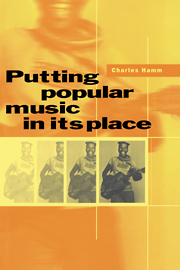Book contents
- Frontmatter
- Contents
- Acknowledgements
- Preface
- 1 Modernist narratives and popular music
- 2 Rock and the facts of life
- 3 Changing patterns in society and music: the US since World War II
- 4 “If I Were a Voice”: or, The Hutchinson Family and popular song as political and social protest
- 5 Some thoughts on the measurement of popularity in music
- 6 Elvis, a review
- 7 Home cooking and American soul in black South African popular music
- 8 Rock ‘n’ roll in a very strange society
- 9 African-American music, South Africa, and apartheid
- 10 “The constant companion of man”: Separate Development, Radio Bantu, and music
- 11 Privileging the moment of reception: music and radio in South Africa
- 12 Music and radio in the People's Republic of China
- 13 Towards a new reading of Gershwin
- 14 A blues for the ages
- 15 Graceland revisited
- 16 Dvořák in America: nationalism, racism, and national race
- 17 The last minstrel show?
- 18 The Role of Rock, a review
- 19 Genre, performance, and ideology in the early songs of Irving Berlin
- 20 Epilogue: John Cage revisited
- Index
12 - Music and radio in the People's Republic of China
Published online by Cambridge University Press: 05 February 2012
- Frontmatter
- Contents
- Acknowledgements
- Preface
- 1 Modernist narratives and popular music
- 2 Rock and the facts of life
- 3 Changing patterns in society and music: the US since World War II
- 4 “If I Were a Voice”: or, The Hutchinson Family and popular song as political and social protest
- 5 Some thoughts on the measurement of popularity in music
- 6 Elvis, a review
- 7 Home cooking and American soul in black South African popular music
- 8 Rock ‘n’ roll in a very strange society
- 9 African-American music, South Africa, and apartheid
- 10 “The constant companion of man”: Separate Development, Radio Bantu, and music
- 11 Privileging the moment of reception: music and radio in South Africa
- 12 Music and radio in the People's Republic of China
- 13 Towards a new reading of Gershwin
- 14 A blues for the ages
- 15 Graceland revisited
- 16 Dvořák in America: nationalism, racism, and national race
- 17 The last minstrel show?
- 18 The Role of Rock, a review
- 19 Genre, performance, and ideology in the early songs of Irving Berlin
- 20 Epilogue: John Cage revisited
- Index
Summary
This analysis of the organization, structure, program content, and political function of the Central People's Broadcasting Station (CPBS) is based on research conducted in the People's Republic of China in September and October of 1988, when I participated in the Visiting Scholar Exchange Program administered by the Committee for Scholarly Communication. My sources are interviews with officials of the CPBS in Beijing and Shanghai; hours of listening to and taping radio programs in Beijing, Tianjin, Xian, Chengdu, Chonqin, and Shanghai, and subsequent analysis of these tapes; discussions with faculty and students at the various conservatories of music at which I lectured, and with members of the Chinese Musicians' Association in Beijing; and information and materials sent to me by Chinese colleagues after my visit.
The timing of my visit, a half-year before the saga of Tiananmen Square, was fortuitous for my work. I was able to travel freely and unaccompanied, and almost everyone I met felt free to speak openly. Many of them, including some state officials, were under the impression that the country was moving decisively towards a greater degree of democracy and free expression. But for an outsider, there was an unmistakable air of schizophrenia, with some individuals and institutions assuming that they could operate with a greater degree of autonomy from the ideology of the central state than was intended by Beijing.
- Type
- Chapter
- Information
- Putting Popular Music in its Place , pp. 270 - 305Publisher: Cambridge University PressPrint publication year: 1995



